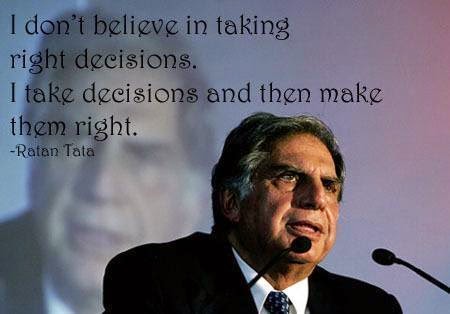In the toughest field of business, where uncertainty at its peak, Ratan Tata is more concerned about making the 'decisions right' instead of focusing on the taking the right decisions. On the other hand, managing the uncertainty of the decisions make the individuals so nervous that they spend huge money and effort in taking 'right choices'.
For instance, students of 10th class in India spend huge money on aptitude tests, counselors, websites of industries. But, as we have found, aptitude tests are useless in identifying the 'hidden talent'. But instead of spending time on choosing right college of graduation, using right learning strategies and developing the right traits, they spend time with Counselors on getting information on jobs and industries.
The same is true with marriage. Instead of preparing themselves for using the 'marriage' to develop themselves, many individuals spend huge time and effort in choosing the 'right partner'.
Uncertainty of facing the consequences of choice makes a person so nervous, that it is estimated that more than 35% use horoscopes to make big decisions. Most of the decisions are supposed to be in the arena of relationships. Astrology, subset of pyschic industry, is a big business. Market size of psychic industry is estimated to be about 2 billion US$. Individuals spend so much money on 'forecasting' because they want to feel in control of their future.
What do entrepreneurs have to learn from the choice-making conundrum?
Individuals are over-occupied with making right choices because they want to be in control. But one can control 'uncertainty' only by making the decision right. For an entrepreneur, this is a very crucial learning.
Once an entrepreneur decides on running his own business, he has to find ways to make his 'decision' right, without getting his ego or emotions in the way. If he spends time in taking a decision, it is only to 'assess' his own capability to commit to the decision.
An entrepreneur's success or failure is measured by the amount of energy and time he puts in making his decision of 'business model' work. I have often seen young entrepreneurs lose their track because they change their 'business models' midway just when the business is 'becoming ready to payback'. They often fail to 'understand their business model' and take actions which is not aligned with their chosen business model. For instead, they refuse to partner with someone to ensure that the right capability is brought on the table. Or they are worried about losing control on the company to get more funds which their business model demands.

No comments:
Post a Comment